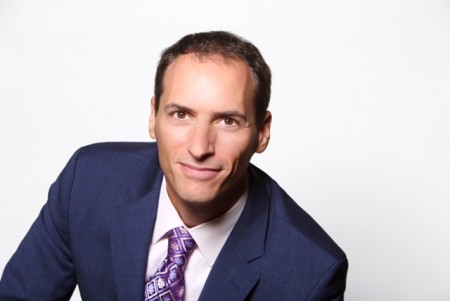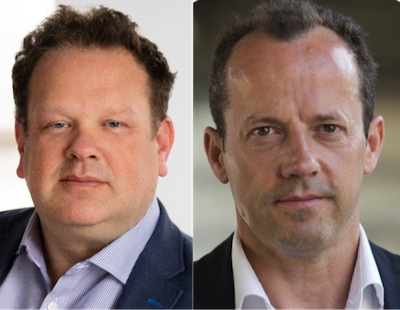How to apply business principles and legal tech to provide humanitarian aid to Ukraine

Ari Kaplan. Photo by Lauren Hillary.
Ari Kaplan recently spoke with Jeroen Plink, the chief operating officer of the Legaltech Hub, a board member at Casetext and the former CEO of Practical Law; and Jeroen Ketting, the founder and CEO of the Lighthouse Group, a provider of management and trade support to Western companies doing business in Russia and Ukraine.
Ari Kaplan: Tell us about your background and your role at the Legaltech Hub.
Jeroen Plink: I served as the CEO of Practical Law U.S. and am currently running the Legaltech Hub, an insights and analytics firm for legal tech. In the early ’90s, I co-founded the Mara Foundation, which at the time, sent humanitarian aid to the former Yugoslavia. We now have teamed up with Jeroen Ketting to help provide humanitarian aid to Ukraine.
Ari Kaplan: Tell us about your background and the genesis of the Lighthouse Group.
Jeroen Ketting: I met Jeroen Plink 32 years ago. In 1994, I moved to Russia and established a number of companies there and later in Ukraine. I put everything I did prior to the start of the war in Ukraine on hold in order to start a humanitarian initiative called Lifeline Ukraine, which has provided over 2 million euros of aid in the last few months.
 Jeroen Plink is the chief operating officer of the Legaltech Hub, and Jeroen Ketting is the founder and CEO of the Lighthouse Group.
Jeroen Plink is the chief operating officer of the Legaltech Hub, and Jeroen Ketting is the founder and CEO of the Lighthouse Group.
Ari Kaplan: How has your legal tech background and network influenced the humanitarian work on which you are collaborating?
Jeroen Plink: There are quite a few people in my network and in our community that have supported the efforts of Lifeline Ukraine. I have also applied a number of the business principles to Lifeline Ukraine that I have leveraged as a co-founder of the Legaltech Hub and in leading Practical Law U.S.
Ari Kaplan: How have you modified your business knowledge and logistics expertise to support your community?
Jeroen Ketting: I started by identifying a need, which is what we all do in business. Since the beginning of the war, my Ukrainian colleagues and business partners have been living and working in cities that are being bombed continuously. They are spending weeks on end in bomb shelters and are not receiving enough aid, so I took the initiative to collaborate with Jeroen Plink because of his prior experience with the Mara Foundation, to establish our own fully controlled end-to-end supply chain and last-mile deliveries to the areas that are hardest to reach. We also wanted to make it a zero-fixed overhead, volunteer-based initiative with a very clear finishing point on Dec. 31, 2022. All of these principles are rooted in what I’ve always done as a businessman and as an entrepreneur. We began providing day-to-day health support through supplies of medicine, food, hygienic care and disposable tableware. Then we progressed into medium-term help by offering durable nonconsumable goods, such as mattresses, water containers and medical equipment. Now, we are progressing through to the third level of providing small-scale solutions to repair damaged infrastructure through the delivery of generators, water filters and solar equipment. Finally, we are offering business acceleration solutions, aimed at reviving small Ukrainian businesses that have become derailed because of the war by providing market access, microfinancing and technology transfers.
Ari Kaplan: What business practices can individuals in the legal community apply to support their broader community initiatives?
Jeroen Plink: We are driving this effort just as we would run a company. Many nongovernmental organizations seem to try to do good, but that doesn’t mean that they do it well. We are approaching everything as if it is a business. Fundraising, for example, is effectively the equivalent of sales. We have identified our targets and established a pipeline for fundraising. Sourcing is performed by people who have been doing this work for large companies, and they are all part of our network of volunteers supporting Lifeline Ukraine. And we have logistics experts, such as Jeroen Ketting and his partner based in Ukraine. It is almost like a legal tech company finding product market fit. By talking to the local NGOs, we know what is needed and source on that need. We are also outsourcing wherever we can, relying on the Mara Foundation, which has been operating for 28 years and is a registered 501(c)(3) organization.
Ari Kaplan: How do you see this initiative developing, and how can the legal and tech community support your efforts?
Jeroen Ketting: Our initiative depends on how the situation in Ukraine develops and, unfortunately, those developments are not positive. The needs are changing continuously in Ukraine, so we are in regular communication with our recipients in the field. At this moment, there is a complete logistics crisis inside Ukraine. Soon, autumn and winter will arrive in Ukraine, which will be very cold. There are a lot of towns and villages that are completely destroyed. People have no place to live. A lot of their fuel and coal that would come out of eastern Ukraine is now in Russian-occupied territories. So what we need to do as quickly as possible is move from the day-to-day aid to helping the Ukrainian economy develop itself by providing business contacts, market access and microfinancing, which is something the legal tech community can support. Obviously, we need financial donations, but we also need supporters to share the work of Lifeline Ukraine on social media and to offer any possible in-kind donations. If the U.S. legal tech community is open to helping small- to medium-sized Ukrainian law firms become more efficient, and do so by hiring Ukrainian software developers, it [will] have a long-term impact. Lifeline Ukraine is creating links, establishing businesses and helping people sustain themselves.
Learn more about Lifeline Ukraine here.
Listen to the complete interview at Reinventing Professionals.
Ari Kaplan regularly interviews leaders in the legal industry and in the broader professional services community to share perspective, highlight transformative change and introduce new technology at his blog and on iTunes.
This column reflects the opinions of the author and not necessarily the views of the ABA Journal—or the American Bar Association.



